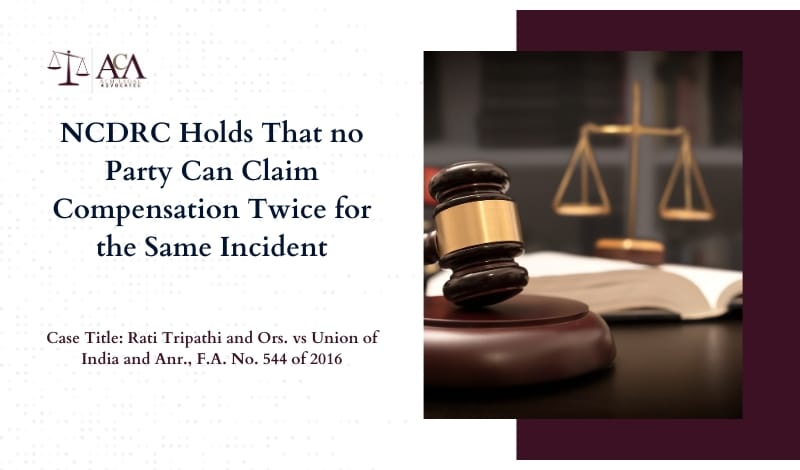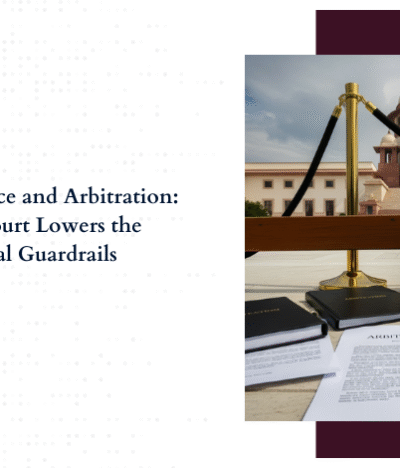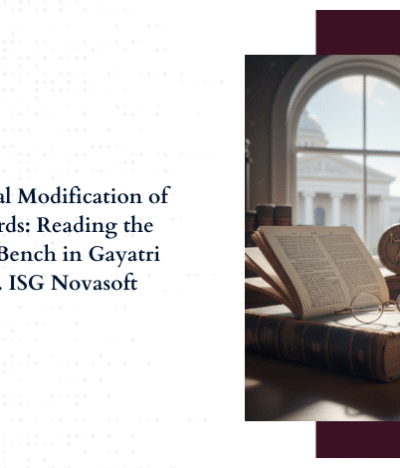The Ld. National Consumer Disputes Redressal Commission (hereinafter referred to as the “NCDRC”) in a recent case of Rati Tripathi and Ors. vs Union of India and Anr., F.A. No. 544 of 2016, held that parties cannot claim compensation for the same incident twice. It was held that while parties have alternate remedies available to them, however, they cannot claim compensation for the same incident twice. The present appeal was filed against the order dated 22.04.2016 passed by the Ld. State Consumer Disputes Redressal Commission.
In the above ruling passed by Mr. Subhash Chandra, Ld. Presiding Member and Dr. Sadhna Shanker, Ld. Member, ruled that the Consumer Protection Act provides a supplemental remedy and does not preclude the jurisdiction of consumer forums in such cases.
Brief Background of the Case
The case revolves around an incident involving Ms. Rati Tripathi (hereinafter referred to as “the Appellants”), who, while travelling on a reserved train berth on 18.11.2014, was attacked by unidentified individuals attempting a robbery. In an unfortunate tussle and attempt to snatch the purse, the Appellant was thrown from the train, resulting in severe injuries, including paralysis on her right side. The Appellant, an academic counsellor, was earning a decent livelihood before the unfortunate incident and has been dependent on others since then. An FIR was registered under Section 394 of the Indian Penal Code,1860. The Appellants sought compensation of Rs.99,40,000/- alleging negligence on the part of the railway staff, including the Train Ticket Examiner (TTE) for allowing miscreants to enter the train and commit such an act.
The State Consumer Disputes Redressal Commission, Madhya Pradesh dismissed the case on the ground that the case fell under the jurisdiction of the Railway Claims Tribunal, as it involved an “untoward incident” as defined under Section 123(c) of the Railways Act, 1989. Aggrieved by this decision, the appellants filed the present appeal before the National Consumer Disputes Redressal Commission (NCDRC).
Issues
The following were identified as the issues in the present matter:
- Whether the complaint is maintainable before the Consumer Forum or falls exclusively under the jurisdiction of the Railway Claims Tribunal?
- Whether the Consumer Protection Act, 1986 can be invoked for claiming compensation in cases involving “untoward incidents” under the Railways Act, 1989?
Appellant’s Arguments
The appellants argued that despite the Railways Act,1989 and the Railway Claims Tribunal Act, 1987 providing mechanisms for compensation, the Consumer Protection Act is a beneficial legislation intended to protect consumers. The Appellants relied on Section 3 of the Consumer Protection Act, which provides an additional remedy.
In order to support their arguments, the Appellants relied on the case of State of Karnataka vs. Vishwabarathi House Building Co-op. Society, I (2003) CPJ 1 (SC), wherein the focus was on maintainability of the complaint under the Consumer Protection Act.
Respondent’s Arguments
The counsel for the Respondents, specifically the Railways, was not present at the time of the hearing on 08.03.2024 but submitted their written arguments. In their written arguments, the Respondents contended that the appellants’ remedy lay exclusively with the Railway Claims Tribunal and therefore, the Ld. SCDRC was correct in dismissing the complaint of the Appellant. They further argued that the appellants failed to furnish documentary evidence proving their version of events and due to lack of substantial evidence, the appeal should be dismissed.
Analysis and Decision
The Ld. NCDRC referred to various provisions of the Railways Act, 1989 and Railway Claims Tribunal Act, 1987 before adverting to their observations and decision.
NCDRC was of the view that a comprehensive system exists for compensating individuals in cases of accidents, untoward incidents, and related matters occurring during railway operations. The Claims Tribunal has been given specific jurisdiction, powers, and authority for such claims. However, the question that arises is whether consumer forums have concurrent jurisdiction to entertain cases involving railway accidents. NCDRC observed that this issue has been reviewed multiple times by the Supreme Court and this Commission in various decisions.
It has been observed that the Consumer Protection Act is a special law designed to offer enhanced protection to consumers across various sectors. While specific industries like banking, insurance, etc. have their own statutes for addressing consumer grievances, the Consumer Protection Act, being a beneficial law, provides an additional remedy. Section 3 of the Consumer Protection Act clearly states that its provisions are supplementary and not in conflict with any other law in force. Thus, a harmonious interpretation of the Consumer Protection Act and the Railways Act suggests that consumer forums still have jurisdiction, even if compensation mechanisms exist under railway laws.
However, the NCDRC, despite deciding in favour of the Appellants, further relied on the Hon’ble Supreme Court decision in Rathi Menon vs. Union of India,(2001) 3 SCC 714, wherein it was held that a person can either approach the Claims Tribunal or avail civil remedies, but cannot claim compensation twice for the same incident.
In view of the aforesaid decision, the NCDRC set aside the State Commission’s order and remanded the matter back to the State Commission for a fresh decision on merits.
Conclusion
The NCDRC’s decision reinforces the view that the Consumer Protection Act, 1986, provides a remedy in addition to those available under the Railways Act and the Railway Claims Tribunal Act. While the Railway Claims Tribunal may have jurisdiction in cases involving untoward incidents, the consumer forum can still entertain complaints related to deficiencies in service, negligence, and other consumer-related issues. The order is a step towards expanding consumer rights and ensuring that victims of such incidents have multiple avenues for seeking justice.






